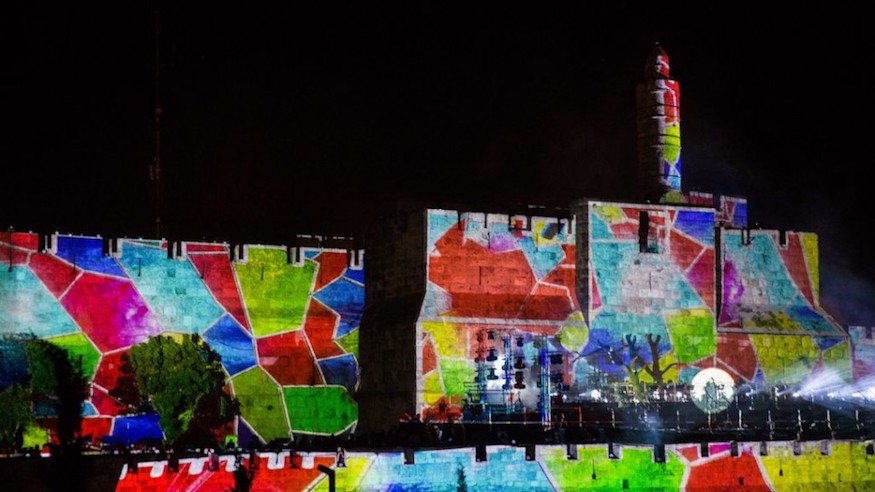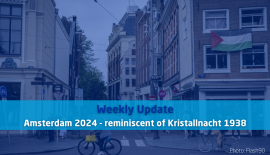Keep Jerusalem United
By Andrew Tucker.. On 7 June 1967, the State of Israel took control of the old city of Jerusalem in the so- called ‘Six Day War’(which lasted from 5-10 June 1967). Israeli Commander Mordechai (Motta) Gur, who led the brigade that captured the Old City on the third day of the war, expressed the significance of this event to the Jewish people when he spoke to his squad:
“For some two thousand years the Temple Mount was forbidden to the Jews… The Western Wall, for which every heart beats, is ours once again. Many Jews have taken their lives into their hands throughout our long history, to reach Jerusalem and live here. Endless words of longing have expressed the deep yearning for Jerusalem that beats within the Jewish heart. You have been given the great privilege of completing the circle, of returning to the nation its capital and its holy centre. Jerusalem is yours forever.”
Soon afterwards, in late June 1967, the State of Israel expanded the municipal boundaries of the city of Jerusalem to include all of what is now known as ‘East Jerusalem’. A law was passed applying Israeli legislation and jurisdiction to the expanded municipality as well as extending public utility services, municipal and administrative facilities to all parts of the city.
Israel’s ‘unification’ of Jerusalem is perhaps one of the greatest controversies of our time. It has ignited furious statements of condemnation in both the political and religious worlds. A multitude of UN resolutions (both General Assembly and Security Council) condemn Israel’s unification of the city as ‘illegal’. The World Council of Churches and many major church denominations have issued statements condemning Israel’s settlements’ in East Jerusalem, calling for an end to the ‘occupation’ and demanding that East Jerusalem becomes the capital of a new state of ‘Palestine’.

Should we, as Christians, support something that seems to be so contrary to international law and scripture? Should we not rather be opposing the reunification, and fighting for the rights of those who are suffering under this occupation?
The claim that the ‘annexation’ of Jerusalem is illegal rests primarily on the argument that the Israelis who moved there after June 1967 were ‘transferred’ by the Israeli government in breach of Article 49(6) of the Fourth Geneva Convention. It is also sometimes argued that East Jerusalem in some way ‘belongs’ to the Arab Palestinians. Those arguments are absurd given that (1) the most important part of what is called ‘East Jerusalem’ is the Old City of Jerusalem – which was founded and established by the Jewish people as their
capital city under King David, and has been their central hope for the last 3000 years; (2) ‘East Jerusalem’was an integral part of the Mandate for Palestine – which was intended to enable close settlement by the Jewish people; (3) Jews have always lived in Jerusalem, and in fact between about 1850 and 1948 the Jewswere the main population group in Jerusalem; and (4) many of the Jews who went to live in ‘East Jerusalem’after 1967 were returning to houses and properties that their families owned but from which they had been illegally evicted by Jordan between 1949 and 1967.
Let’s try to understand what the ‘reunification’ of Jerusalem means on the ground. First, the Israeli law applicable to the municipality is not perfect, but it does protect all residents of Jerusalem – whether citizens of Israel or not. If a Palestinian resident of Jerusalem feels, for example, that his property has been unjustly expropriated or destroyed, he can apply to the Israeli Supreme Court to have his grievances addressed. You can be sure that Jews and Christians in the proposed new state of Palestine will not have such civil liberties.
Residents of Jerusalem also benefit from freedom of speech, worship and religion. It is worth bearing in mind that under the 19 years in which Jordan ‘occupied’ East Jerusalem and the West Bank (from 1949 – 1967), ALL Jews were evicted, and ALL Jewish synagogues and holy places were destroyed or desecrated, and Christians were subject to institutionalised persecution and discrimination. This is reflected today in the administration of the Temple Mount – under the Jordanian Waqf non-Muslims are not even allowed to pray openly in the Temple Mount area. Contrast this with Israel, where Christians, Muslims, Jews and others are allowed to practise their religion without restraint.
All residents of Jerusalem now benefit from the public services and facilities offered by the municipality. Millions of shekels have been invested in new social and economic infrastructure in the unified city since 1967. Granted, there are issues of discrimination between those who are Israeli citizens and those who are only ‘residents’ in East Jerusalem. But there can be no doubt that ALL residents of Jerusalem – both citizens and non-citizens – are better off under the current regime than they would be under any alternative system.
It is often argued that East Jerusalem is being isolated from Arab West Bank. Palestinians living outside the Green Line (on the ‘other’ side of the security barrier) have to pass through security checkpoints to reach their work or other activities in Jerusalem. East Jerusalem is in some kind of isolated economic and social limbo, that threatens development and discriminates against its residents. These arguments are valid. But they need to be put in perspective. What would be the condition of the residents of Jerusalem and the West Bank under an alternative scenario? As already mentioned, one only needs to look back at the situation under Jordaniancontrol between 1949 and 1967, or the current situation in the Islamic countries in the neighborhood, to realise that the re- unification of Jerusalem has on the whole – without disputing the fact that there are individual cases of injustice – improved the lives of all residents of Jerusalem – both Jewish and non-Jewish.
What does the Bible say about Jerusalem? Does God still have a special relationship with this city? Has the Old Testament – with its ‘fleshly’ emphasis on the land, the Temple, the priesthood, and the law – not been replaced by the New Testament of grace, mercy and the Holy Spirit? Have God’s promises about the land not been fulfilled in Jesus? Are we not commanded to look for the ‘heavenly’ Jerusalem instead of the ‘earthly’ Jerusalem?
We do believe that although Jesus Christ through His life, death, resurrection and ascension introduced a new order of things, God has not terminated His special relationship with the Jewish people as a nation and the literal, earthly city of Jerusalem. The restoration of the earthly Jerusalem (Zion) is connected with the return of Jesus Christ, and the coming of the Kingdom ‘on earth, as it is in heaven’. Jesus is coming again soon to establish God’s kingdom on earth for the benefit and blessing of ALL nations. Scripture tells us the word of the Lord WILL go forth into the nations from Jerusalem (Isaiah 2). As God promised to Abraham, it is through restored Israel that the nations will be blessed.
We are the generation that is witnessing the restoration of Jerusalem in preparation for the coming of Messiah. That is why it is so vitally important to ensure that the city is not divided into separate ‘Israeli’ and ‘Palestinian’ cities.

Andrew Tucker
Executive Director Christians for Israel International
Legal Counsel to the European Coalition for Israel





